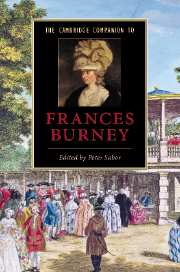Book contents
- Frontmatter
- Introduction
- 1 The Burney family
- 2 Evelina and Cecilia
- 3 Camilla and The Wanderer
- 4 Burney as dramatist
- 5 Journals and letters
- 6 Burney and politics
- 7 Burney and gender
- 8 Burney and society
- 9 Burney and the literary marketplace
- 10 The afterlife and further reading
- Further reading
- Index
- Series List
5 - Journals and letters
Published online by Cambridge University Press: 28 September 2007
- Frontmatter
- Introduction
- 1 The Burney family
- 2 Evelina and Cecilia
- 3 Camilla and The Wanderer
- 4 Burney as dramatist
- 5 Journals and letters
- 6 Burney and politics
- 7 Burney and gender
- 8 Burney and society
- 9 Burney and the literary marketplace
- 10 The afterlife and further reading
- Further reading
- Index
- Series List
Summary
One day in 1790, outside St George's Chapel, Windsor, Frances Burney, Keeper of the Robes to Queen Charlotte at the Court of George III, encountered James Boswell. He was there to beg from her materials for his Life of Dr Johnson. 'We saluted with mutual glee', she wrote; 'his comic-serious face and manner have lost nothing of their wonted singularity.' He began by demanding that she resign her position at Court - 'it won't do, ma'am!' - but soon moved onto his main mission: 'I want your help', he declared, 'you must give me some of your choice little notes of the Doctor's; we have seen him long enough upon stilts; I want to show him in a new light.' She tells him she doesn't have them to hand, but he persists and persists, until they reach the railings of the Queen's lodge. Now, Boswell begins to read a letter of Johnson to himself, 'in strong imitation of the Doctor's manner', which Burney, in other circumstances, might have enjoyed.
“But Mrs. Schwellenberg was at her window, a crowd was gathering to stand round the rails, and the King and Queen and Royal Family now approached from the Terrace. I made a rather quick apology, and, with a step as quick as my now weakened limbs ha[d] left in my power, I hurried to my apartment.” (DL IV, 431-3)
This incident was not written up for publication. Like Boswell, the other great life-writer of the age, Burney wrote about her own experiences copiously, even obsessively, and, like Boswell, she collected famous 'characters' and incidents. Like Boswell, she took notes, though not, as he did, on the spot. Instead - and throughout her life - she seems to have written brief 'memoranda' on scraps of paper, which served to jog her memory when she wrote them up, often shortly afterwards, but sometimes much later.
- Type
- Chapter
- Information
- The Cambridge Companion to Frances Burney , pp. 75 - 92Publisher: Cambridge University PressPrint publication year: 2007
- 3
- Cited by

